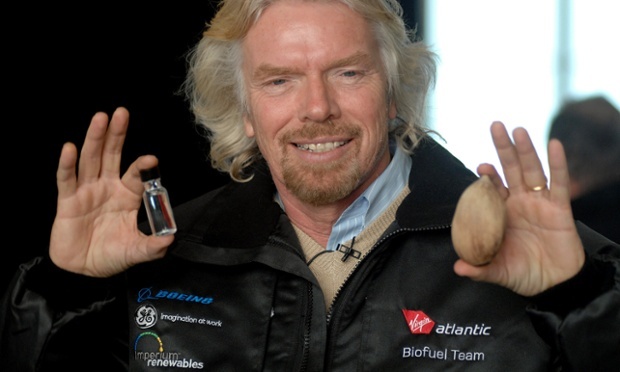Saudi Arabia is encouraging the dramatic collapse of oil prices in order to damage the surging global clean energy industry, British entrepreneur Richard Branson has claimed. “They have done it before and it hurt. They don’t just want to damage the US fracking industry, but also the clean energy business. The collapse of oil prices is going to make it much more difficult for clean energy,” he warned, speaking from the Caribbean island of Necker.
But the British entrepreneur said that now was the time for governments wanting to reduce their carbon emissions to introduce a carbon tax on fossil fuel users because the tax would be cushioned by the fall in prices.“If governments want a carbon tax [at the climate summit ] in Paris next year, then it would be the best time. What the clean energy business needs is a gap between it and coal and oil.”
According to Branson, who part-owns Virgin airlines and has invested an estimated £300m in a succession of green fuel, solar and other clean-tech energy developments, the dramatic rise of renewables over the last few years has hurt oil producing countries as much as fracking. “Before the oil price collapsed, solar was actually cheaper [than oil]. If oil goes down to $30-$40 a barrel, then it will make it much harder for clean energy. Governments are going to have to think hard how to adapt to low oil prices,” he said.
Branson was talking ahead of the merger of his not-for-profit low-carbon thinktank Carbon War Room with the Rocky Mountain Institute (RMI). The latter was set up in 1982 by the west’s most celebrated energy-theorist, Amory Lovins. The two philanthropic organisations that Branson and Lovins head are unique in that they both advise businesses and governments how to reduce carbon emissions.
“We both bring something. Carbon War Room is bold and agile, RMI has the rigour,” said Branson, who said he would continue to support the new operation financially. In a joint statement, the two organisations said they planned to expand into China and elsewhere to transform carbon-based economies “with a combination of science, technology and a‘let’s do it’ business spirit”.
“We are closer than ever before to transforming the world’s economy to a lower-carbon trajectory. We need to accelerate demand and financing for low-carbon solutions, and quickly. We are both market-based, independent, nonpartisan, and working with technologies that are cost-effective today. We are excited by the role we have in what could be a historic economy-wide turning point for the world’s energy challenge”, said Lovins.
“The climate challenge is no longer one of only gloom and doom, sacrifice, caps and taxes, or having less. The world has advanced considerably since the failed Copenhagen talks of 2009. Despite the economic recession, there are more and more proven, cost-effective, low-carbon solutions that are technically feasible and economically profitable today under current policy. The energy costs of wind and solar are now on parity with fossil fuels in the Caribbean, Hawaii, Alaska, and other diesel thirsty regions,” said Lovins, whose organisation helped to retrofit the Empire State building to safe energy.
According to Lovins, the energy revolution is now in full swing, but many industries have not taken advantage of it. “The unsubsidised cost of electricity from the most cost-effective new onshore wind projects beats all other forms of generation. Solar PV modules have dropped in price by about 80% since 2008, while LED lights are 85% cheaper than five years ago. The integration of various clean technologies, like electric cars, batteries and solar panels, are mutually reinforcing the drive towards competitiveness.”
“We believe this alliance offers the best philanthropic return on investment today, Our role will be a catalytic one – to drive business, industry by industry, to a tipping point where choosing anything but the clean option won’t make good business sense. Together, we will multiply our efforts to drive capital flow and reduce carbon by achieving industry-changing impact and international headlines that promote the breakthroughs and the pioneers achieving them,” said Jules Kortenhorst, who will serve as chief executive officer of the new organisation.
Lovins is credited with helping to kickstart the global renewable energy revolution with a series of academic and policy papers in the 1960s and 70s. Since then, the Rocky Mountain Instistute has advised many of the world’s largest companies and dozens of countries how to reduce bills with renewables and has challenged the giant car, aviation and construction industries to rethink the way they operate.
But Branson and Lovins are expected to disagree on some energy matters. The businessman is a known advocate of nuclear power, while Lovins earlier this year called Britain’s plans to build a new generation of reactors as“unbelievable”. “Nuclear prices only go up. Renewable energy prices come down. There is absolutely no business case for nuclear. The British policy has nothing to do with economic or any other rational base for decision making.”, he said.

